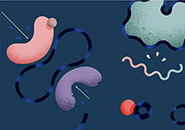Diversity in the sciences has become a very important goal. In everything we do at the Howard Hughes Medical Institute, we are trying to cast the net wide. Quality is everywhere—and it’s our job to go find it.
The Visitor Program at Janelia Research Campus, highlighted in this issue of the HHMI Bulletin, exemplifies that philosophy. The idea of welcoming visiting scientists to Janelia to collaborate and make use of its resources was baked into the research center’s earliest planning. In fact, that’s how I got involved at Janelia in the first place, back in 2005, when I was still an HHMI investigator at the University of California, Berkeley. I saw Janelia as an opportunity to jump into an entirely new field—molecular imaging—which now represents some 85 percent of my research program. The imaging technologies that Janelia researchers shared were a complete game changer, both accelerating and deepening my studies of gene regulation.
Diversity of all kinds gives our endeavors the deepest possible talent pool and the best chance for accelerating scientific progress.
Robert Tjian
And it’s absolutely a two-way street. Janelia has reaped huge rewards from the influx of visiting scientists from across the United States and 23 other countries to date. Because Janelia’s visiting scientists come in from such diverse institutions and locations, bringing technologies, expertise, and their unique viewpoints with them—as happened with my team—the effect on the whole enterprise becomes exponential.
Indeed, diversity of all kinds—not only of research field and expertise, but also of culture, ethnicity, and gender—gives our endeavors the deepest possible talent pool and the best chance for accelerating scientific progress. On the science education side, HHMI aims to increase the number of underrepresented minorities in the sciences through the expansion of a highly successful program from the University of Maryland Baltimore County (UMBC). The Meyerhoff Adaptation Project, also featured in this issue of the Bulletin, will attempt to identify the elements of UMBC’s Meyerhoff Scholars Program that ensure the retention of minority students majoring in science, technology, engineering, and math. We’re very pleased to be supporting the University of North Carolina at Chapel Hill and Penn State University in establishing scholar programs on their campuses, and for committing to rigorous documentation and evaluation. Our hope is that, by identifying a set of core principles and methods, this type of program can be put into place on university campuses across the country.
Finally, we’re mindful of the need for more balanced gender representation in the sciences, including in leadership positions. We are pleased to report that half of HHMI’s senior executive team is female, including both our executive vice president/chief operating officer and our chief scientific officer. But more needs to be done to encourage talented scientists and educators who are women. Indeed, we have plenty of work ahead to expand opportunities in the sciences for all who have talent and ability, and we’re committed to progress. I’m optimistic.







